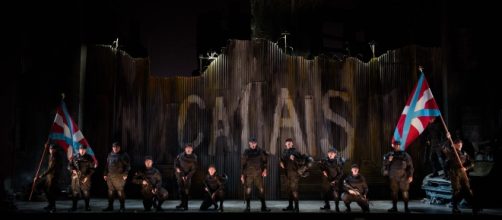Opera, according to Everything Music and Theatre, doesn’t get much better than the 70 that 19th-century bel canto master Gaetano Donizetti created. His 49th, from 1836, “L’assedio di Calais” (The Siege of Calais), was his first foray into French grand opera style, with its abundant choral pieces and concerted ensembles among the principal singers. For Donizetti, grand opera doesn’t get much grander, nor does it even for composers more readily evoked when thinking of that opulent musical style. So why “The Siege of Calais” had to wait 181 years before finally premiering in the U.S.
— at Cooperstown’s Glimmerglass Festival — is simply beyond reckoning. Its opening performance, Sunday, July 16, was thrilling, at times mesmerizing, always thought-provoking.
Lead roles
Soprano Leah Crocetto is Eleonora, wife of Aurelio. Her instrument is huge but not unwieldy, pliable, with ample agility to negotiate the intricate passagework of a romantic bel canto role. Aurelio is a trouser role played by mezzo-soprano Aleksandra Romano, whose supple, warm voice conveys the gamut of emotions, from anguish and heartbreak to heroism. Baritone Adrian Timpau, from Moldova, who joins the Metropolitan Opera’s Lindemann Young Artists Development Program this fall, portrays Aurelio’s father, Eustachio, Mayor of the besieged Calais.
His powerful baritone provides dramatic gravitas without getting gravelly.
Musical highlights
Act II begins with a fantastic duet and cabaletta for Aurelio and Eleonora, “Io l’udia chiamarmi a nome … La speme un dolce palpito mi suscitò nel seno” (I heard him call my name … Hope stirred a sweet beating in my heart), which brings down the house. The cabaletta is very similar in character to the cabaletta to “Mira, oh Norma” from Vincenzo Bellini’s “Norma” of five years earlier. Act II ends with a sincere prayer set as a sextet for Aurelio, Eustachio and four citizens of Calais, later augmented by the chorus. The quiet, unaccompanied beginning, the gradual entry of the orchestra, as if tip-toeing, the joining in of the chorus, all building to a tremendous concerted showpiece is very moving.
Here, the duet comes tacked on as Act I, Scene 2, and the rest starts Acts II and III, performed without interruption.
The Royals
England’s King Edward III (Edoardo) and Queen Isabella (historically Philippa) are baritone Michael Hewitt and soprano Helena Brown. Edoardo’s egotistical thirst for blood is tempered and tamed by the regal Isabella, who is compassionate and sensible. Both singers fully inhabit their brief roles, and Ms. Brown’s dusky voice is one of those few that are uniquely and readily identifiable after just a few notes.
Setting the pace and tone
Maestro Joseph Colaneri does far more than beat time from the podium. He guides and paces the orchestral and vocal forces on both sides of the footlights.
Chorus Master David Moody produces a wall of sound from what appears to be just a 14-member male chorus, joined only in the finale by perhaps as many women. Indeed, the chorus plays a leading role as the voice of the people in this stirring opera. Director Francesca Zambello, known for colorful productions, accomplishes a great deal with dingy gray and grimy black—the dominating shades of this dark work.
Updated setting
James Noone’s sets depict, not the 14th- but the 21st-century French coastal city of Calais, where, until recently, a "siege" by waves of immigrants and, mainly, refugees was underway. The abandoned automobile, the tires and television set, the pile of garbage bags and rubble, the corrugated metal barrier and razor wire all suggest what traditional opera lovers are wont to disparage as Eurotrash.
Yet prewar sieges aren’t pretty, so Mr. Noone has a point. The three-story turntable tenement dwelling depicts a “home” that refugees would welcome so long as they escape what they have fled. So give it a chance, enjoy the taut drama, think of what might soon happen to us all if war reaches these parts and just revel in the moving music Donizetti ingeniously crafted.
Dearth of Donizetti
Artistic and General Director Francesca Zambello recently confessed having somehow overlooked Gaetano Donizetti, in programming the last several seasons, and he is again missing from the just-announced 2018 season. To show due remorse, she could plan a Donizetti Festival for 2019 with an Elizabethan theme expounded by, say, the never-done “Rosmonda d’Inghilterra,” the evergreen “Anna Bolena,” the needs-more-exposure “Maria Stuarda” and the growing-in-popularity “Roberto Devereux.” Wagner has his Ring Cycle.
Donizetti deserves his own tetralogy—the, er, uh … Queen Cycle—don’t you think?
“The Siege of Calais,” by Gaetano Donizetti, runs until Aug. 19 at the Glimmerglass Festival, located at Alice Busch Opera Theater in Cooperstown, N.Y.


